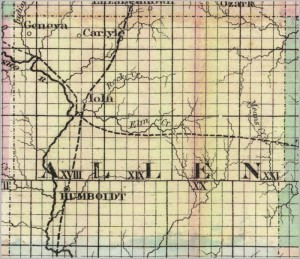Allen County, Kansas

- Formed: 1855
- County Population 1860: 3,082
Image courtesy of Wichita State University Special Collections
One of the earliest settlers in the area was Richard Fuqua in January, 1855. Fuqua and his family traded with the Sac and Fox Native American Tribe. The Fuqua family moved to Oregon in 1863 to escape the Civil War. W.C. Keith, Henry Bennett, Elias Copelin, Barnett Owen, Giles Sater, Thomas Day, D.H. Parson, James Barnes, Charles Passmore, Kasnal Martin, J.W. and Harmot Scott, Aaron Case, and H.H. Hayward were also among other early settlers. They were drawn by the abundance of fresh water rivers and creeks and the ample acres of prairie land for grazing livestock. The thick timber and building stone deposits encouraged settlers to remain in the area. Allen County was officially organized March 30, 1855. It was named after William Allen, a congressman from Ohio. Several Townships were organized, including Osage, Deer Creek, Geneva, Iola, Elm, Marmaton, Elsinore, Salem, Humboldt, and Cottage Grove.
Although there were pro-slavery residents among the early settlers, very few of them actually owned slaves. Those that moved to the area with slaves either set them free or moved to another area shortly after arrival to escape the predominant anti-slavery sentiment in the county. The first and only town in the county at the time of its organization was Cofachique, founded by a group of pro-slavery residents. Cofachique became the county seat in September of 1855. However, because of its ties to pro-slavery sentiments and its location on hilly ground, which made it difficult to access water, the town’s population was already in decline by 1857. The county seat was moved to Iola in this same year.
In the spring of 1856, a group of settlers from the Northeast formed a short-lived vegetarian colony near present-day Humboldt. However, by the summer and fall, many of the colony members fell ill and returned home. Several members did remain in the county, however, including Charles Baland and Z.J. Witzler. The area where they settled is still known as Vegetarian Creek.
Not directly on the border with Missouri, Allen County did not suffer as much from border raids as counties directly on the Missouri-Kansas border. However, the years leading up to the Civil War and Kansas’ entrance into the Union as a free state were tumultuous for Allen County. They did suffer from border ruffians’ harassment and attempts to defraud their elections, though there were no notable violent raids like those that occurred in other counties. In 1860, a terrible drought occurred in Allen and other counties in Kansas, forcing many residents to flee to other areas in search of food.
When the Civil War broke out in 1861, the majority of Allen County men joined Union regiments. The Iola Battalion formed in the same year, consisting of three companies under Captains Coleman, Flesher, and Killen. The 7th, 9th and 10th Kansas also formed in Allen County, under the command of Captain J.H. Lane, Captain W.C. Jones, and Captain N.B. Blanton, respectively. Captain Lane and other troops left Allen County and there were few troops or men left in the county to defend it. On September 8, 1861, Missouri Guerrillas together with members of the Cherokee and Osage tribes, under Captains Matthews and Thomas Livingston, attacked Humboldt, destroying a great deal of property, but there was little resistance to the raid since most of the men were absent. During the war, Humboldt became a prized location for the both armies because of its southern location and proximity to Missouri and Indian Territory. After the attack on Humboldt, Dr. George A. Miller and Captain Henry Dudley organized the Allen County Home Guards, who took part in several skirmishes in defense of the county.
On October 14, 1861, a Confederate Cavalry under Colonel Talbott surprised the Allen County Home Guards, who promptly fled and Humboldt was burned. The County then formed other militia units, with three companies form Iola, two from Humboldt, and one from the southern part of the county. Captains J.M. Moore, G. DeWitt, and D.C. Newman were among the leaders of these companies. There was little military action in the county until 1864, when General Sterling Price led an unsuccessful raid into Missouri and Kansas.
After the war, Allen County recovered gradually from the losses accrued during the war and from the drought before the war. Railroad construction began in the 1870s, and a cement factory opened, both of which aided recovery.
 Browse all collections in Allen County
Browse all collections in Allen County
- Consulted:
- http://www.kshs.org/portraits/allen_county.htm
- http://skyways.lib.ks.us/counties/AL/
- William G. Cutler, History of the State of Kansas (Chicago: A.T. Andreas, 1883). Accessed through:
- http://www.kancoll.org/books/cutler/allen/allen-co-p1.html
- Humboldt, Kansas, A Civil War Survivor, http://www.humboldtks.net/content/history
- Frank W. Blackman, Ed., Kansas: A Cyclopedia of State History, Embracing Events, Institutions, Industries, Counties, Cities, Towns, Prominent Persons, etc. (Standard Publishing Company, 1912) Accessed through http://www.skyways.org/genweb/archives/1912/a/allen_county.html












